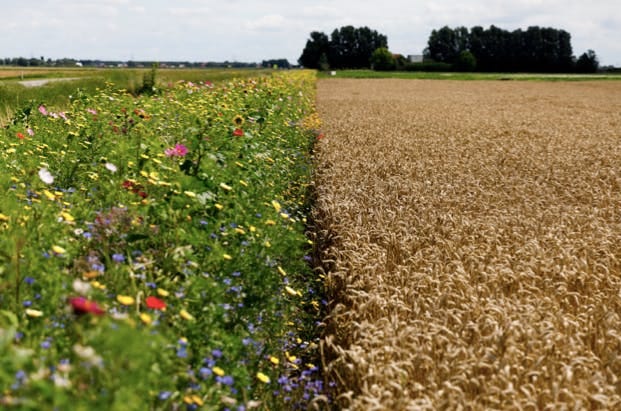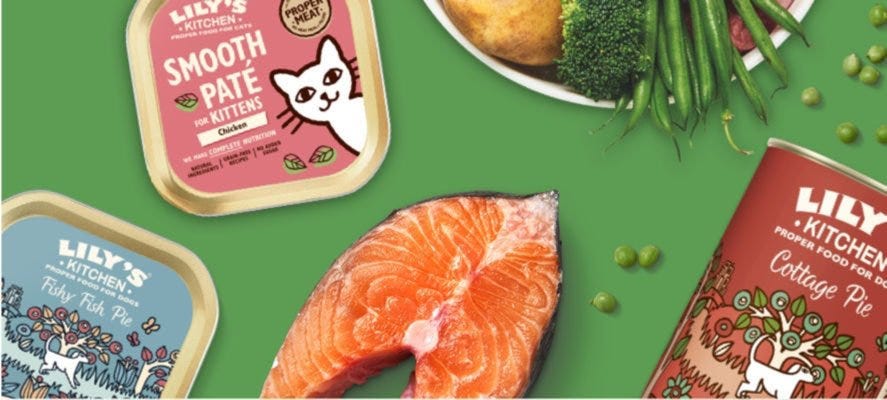🌱 Lily's Kitchen: The Plant-Based Pet Food Pioneers.
Featuring Lily's Kitchen, Organic Valley, IKEA, allplants and more...
Happy Friday!
What we’re covering this week:
Why 3 brands are reducing their Scope 3 emissions by collaborating with their suppliers.
How Lily’s Kitchen have quickly become the plant-based pet food pioneers.
In case you missed it: 'I asked my employer, BrewDog, to bank on a better future and leave HSBC. Here's why.' - written by a BrewDog employee.
> Good News This Week
🎯 Ella’s Kitchen, a B Corp, published their Good Stuff We Do Report, detailing their progress towards Net Zero by 2030.
🎯 Dr Will’s, an all natural condiment company certified B Corp, have crowdfunded over £939,000 on Seedrs, beating their £400,000 target with time still left to invest.
⭐️ Costa Coffee announced the extension of their partnership with Bio-bean, ensuring their used coffee grounds are recycled.
⭐️ Deliveroo has partnered with circular food packaging startup barePack France to trial reusable meal packaging with 60 restaurants in Paris, France.
⭐️ Unilever claimed a world first with a paper-based laundry bottle, made of sustainably sourced pulp and recyclable in the paper waste stream.
⚡️ TechNation launched Tech Zero, a task-force of fast-growing UK tech companies working together to accelerate progress to net zero. Founding partners include allplants, bulb and OLIO.
⚡️ The G7 members announced that they want to end coal financing, spend $100 billion annually to finance climate action in developing countries and reach Net Zero by 2050. However, this is a goal many scientists have argued is too late.
> Click on each link to read more.
> Quick Take
Sponsor Your Scope 3, Reduce Your Emissions
90%. That’s a typical percentage of a brand’s total greenhouse gas emissions that can be found in their Scope 3. Hard to measure, harder to mitigate, yet a critical focus for a low carbon future - how can brands speed up the process of reducing their biggest hotspot?
Firstly, let’s recap. What are Scope 3 emissions? Scope 3 emissions are indirect greenhouse gas emissions resulting from a company’s operations. Employee commutes, harvesting of crops, or the end-of-life of a company’s products all count. Read more here.
For fast-moving consumer goods companies, especially startups and SMEs, Scope 3 can be tricky to measure and even trickier to mitigate. From Pip & Nut to TENZING, we’ve spoken to many brands who have detailed how hard it is to even get data on their global supply chain, let alone influence supply chain actors (like manufacturers) to reduce their emissions. Whilst suppliers, vendors and manufacturers remain largely out of the public eye, pressure to change is a task often left to brands - a big ask if you’re 1/10th the size of their other partners.
One consumer goods brand articulated this struggle to us:
“We’re a small company, so we can’t just ask our suppliers to abide by our sustainability policies and then if they don’t, we move on. It doesn’t work like that. Some of our products are in the same manufacturing centres as Coca Cola, and if we said ‘guys, please stop wrapping the products in so much plastic’ they wouldn’t listen.”
The We Mean Business Coalition calls for collaboration, and we agree. Tackling Scope 3 emissions and engaging a supply chain can be achieved. Hotspots need to first be identified, then engaged, then supported in moves to shift to more sustainable practices. Organic Valley announced in April 2021 that they were loaning their dairy farmers funds to enable a quicker transition to renewable energy. With long-term positives to a green-energy switch for both farmer and brand, Organic Valley’s support helps leapfrog the upfront cost of this switch, which is often unattainable to many farmers. Similarly, IKEA announced just last week that it is striving for 100% renewable energy throughout its entire value chain. To reach this goal, IKEA is launching a programme in India, Poland and China that supports nearly 1,600 direct suppliers in their switch to 100% renewable energy.
What does this mean for smaller businesses? Organic Valley and IKEA have very deep pockets, but that’s not a requirement for Scope 3 collaboration. allplants, a frozen vegan meal delivery service founded in 2017, recently announced their partnership with Soil Heroes. Soil Heroes ‘enable businesses to engage with farmers in order to make the transition towards regenerative (organic) agriculture by paying them for the benefits (ecosystem services)’ . To start, allplants will be ‘working shoulder to shoulder’ with Showsley Farm (UK) to help them introduce regenerative agriculture to their land and sequester an additional 67.5 tons of CO2 every year. For food and drink businesses, partnering in a similar way with suppliers can not only reduce Scope 3 emissions, but also supply chain risk. Other Soil Heroes partners include Huel, Patagonia and Toast Ale - to name a few.
Read more about each partnership:
Interested? Follow up with:
Climate Action in the Value Chain: Reducing Scope 3 Emissions and Achieving Science-Based Targets
5 Top Tips for Tackling Your Organisation’s Scope 3 Emissions on the Road to Net Zero
Clearing scope 3 hurdles to set your science-based climate target

Haven’t subscribed to Following the Footprints yet?
> Brand Spotlight
Lily’s Kitchen: The Plant-Based Pet Food Pioneers
The pet food industry, worth 91 billion USD globally, is a beast. Unfortunately, big beasts make big footprints, and the industry currently has annual emissions of 106 million tonnes of CO2. So, how did Lily’s Kitchen become the first B-Corp pet food company in the world? Sheer diligence.
Lily’s Kitchen runs a tight ship. They pay attention to every aspect of their operations, and this is the secret to their success. Their offices reduce and recycle everything they can, using 100% renewable energy. Every step of the distribution journey, from source to customer, is considered. As well as a no air-freight policy, they strategically plan journeys to reduce fuel waste and have recently built a European distribution centre (see our recent analysis of the importance of ‘last mile delivery’). When it comes to the food itself, every care is taken. They source their ingredients precisely and deliberately. Investment in R&D has even allowed them to craft a unique nutritionally complete plant-based pet food, reducing their reliance on carbon-intensive meat. Lily’s Kitchen have seized every opportunity to minimise their carbon footprint, and it’s paying dividends. This year they achieved an impressive Overall B Impact Score of 91.1 - up from 86.9 just six years ago and the highest score given to a pet food company. It’s no wonder that, in a rapidly growing market, Lily’s Kitchen dominates the natural pet food scene.
No business is an island. Crucial to Lily’s Kitchen’s strategy is collaboration and communication. Distribution partners include Simarco and DPD, both industry leaders in green logistics. Each supplier is asked to provide a yearly report on environmental impact and improvements. Packaging is recycled through Terracycle and they’re continually working with packaging innovators to reach new targets. Targets that they continue to make and meet.
Lily’s Kitchen may be great at marketing their green credentials, but there’s no fluff here. By working to a carefully ‘peticured’ Environmental Management System, they really walk the talk. There’s no real secret to Lily’s Kitchen’s success. That’s half the point. They put in the graft. Pawprint by pawprint, they just get on with it.
Next Steps:
See Lily’s Kitchen’s Impact Report ‘Pawprint for Progress’ for more details and inspiration.
Find the right green logistics partner for you. GEFCO is one option, also providing a handy guide.
Never heard of an Environmental Management System? Here are two step-by-step guides: (1)(2).




